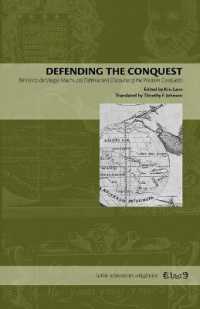Full Description
This handbook compares the main analytic frameworks and methods of contemporary linguistics. It offers a unique overview of linguistic theory, revealing the common concerns of competing approaches. By showing their current and potential applications it provides the means by which linguists and others can judge what are the most useful models for the task in hand. Distinguished scholars from all over the world explain the rationale and aims of over thirty explanatory approaches to the description, analysis, and understanding of language. Each chapter considers the main goals of the model; the relation it proposes from between lexicon, syntax, semantics, pragmatics, and phonology; the way it defines the interactions between cognition and grammar; what it counts as evidence; and how it explains linguistic change and structure. The Oxford Handbook of Linguistic Analysis offers an indispensable guide for everyone researching any aspect of language including those in linguistics, comparative philology, cognitive science, developmental philology, cognitive science, developmental psychology, computational science, and artificial intelligence.
This second edition has been updated to include seven new chapters looking at linguistic units in language acquisition, conversation analysis, neurolinguistics, experimental phonetics, phonological analysis, experimental semantics, and distributional typology.
Contents
1. Introduction ; 2. Linguistic Units in Language Acquisition ; 3. The Adaptive Approach to Grammar ; 4. The Cartography of Syntactic Structures ; 5. Categorial Grammar ; 6. Cognitive Grammar ; 7. Embodied Construction Grammar ; 8. Sign-Based Construction Grammar ; 9. Conversation Analysis ; 10. Corpus-Based and Corpus-Driven Analyses of Language Variation and U ; 11. Dependency Grammar and Valency Theory ; 12. An Emergentist Approach to Syntax ; 13. Framework-Free Grammatical Theory ; 14. Functional Discourse Grammar ; 15. Systemic Functional Grammar and the Study of Meaning ; 16. Lexical-Functional Grammar ; 17. Grammaticalization and Linguistic Analysis ; 18. Linguistic Minimalism ; 19. Morphological Analysis ; 20. Neurolinguistics: A Cooperative Computation Perspective ; 21. Experimental Phonetics ; 22. Phonological Analysis ; 23. Optimality Theory in Phonology ; 24. Optimization Principles in the Typology of Number and Articles ; 25. The Parallel Architecture and its Place in Cognitive Scienc ; 26. Neo-Gricean Pragmatic Theory of Conversational Implicature ; 27. Relevance Theory ; 28. Probabilistic Linguistics ; 29. Linguistic Relativity ; 30. Role and Reference Grammar as a Framework for Linguistic Analysis ; 31. Default Semantics ; 32. Experimental Semantic ; 33. A Frames Approach to Semantic Analysis ; 34. The Natural Semantic Metalanguage Approach ; 35. The Analysis of Signed Languages ; 36. Simpler Syntax ; 37. Distributional Typology: Statistical Inquiries into the Dynamics of Linguistic Diversity ; 38. Formal Generative Typology ; 39. Usage-Based Theory ; 40. Word Grammar








